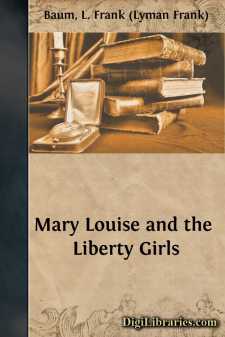Categories
- Antiques & Collectibles 13
- Architecture 36
- Art 48
- Bibles 22
- Biography & Autobiography 813
- Body, Mind & Spirit 142
- Business & Economics 28
- Children's Books 17
- Children's Fiction 14
- Computers 4
- Cooking 94
- Crafts & Hobbies 4
- Drama 346
- Education 46
- Family & Relationships 57
- Fiction 11829
- Games 19
- Gardening 17
- Health & Fitness 34
- History 1377
- House & Home 1
- Humor 147
- Juvenile Fiction 1873
- Juvenile Nonfiction 202
- Language Arts & Disciplines 88
- Law 16
- Literary Collections 686
- Literary Criticism 179
- Mathematics 13
- Medical 41
- Music 40
- Nature 179
- Non-Classifiable 1768
- Performing Arts 7
- Periodicals 1453
- Philosophy 64
- Photography 2
- Poetry 896
- Political Science 203
- Psychology 42
- Reference 154
- Religion 513
- Science 126
- Self-Help 84
- Social Science 81
- Sports & Recreation 34
- Study Aids 3
- Technology & Engineering 59
- Transportation 23
- Travel 463
- True Crime 29
Sort by:
CHAPTER I. THE BOY IN THE STRAW HAT. "How's craps, Country?" "Shut up, Bart! he may hear you." "What if he does, ninny? I want him to. Say, Spinach!" "Do you suppose he's going to try and play football, Bart?" "Not he. He's looking for a rake. Thinks this is a hayfield, Wall." The speakers were lying on the turf back of the north goal on the campus...
more...
This book suggests that the real Pharaoh of the Exodus was not Meneptah or Merenptah, son of Rameses the Great, but the mysterious usurper, Amenmeses, who for a year or two occupied the throne between the death of Meneptah and the accession of his son the heir-apparent, the gentle-natured Seti II. Of the fate of Amenmeses history says nothing; he may well have perished in the Red Sea or rather the Sea...
more...
by:
Lewis Wallace
CHAPTER I The Jebel es Zubleh is a mountain fifty miles and more in length, and so narrow that its tracery on the map gives it a likeness to a caterpillar crawling from the south to the north. Standing on its red-and-white cliffs, and looking off under the path of the rising sun, one sees only the Desert of Arabia, where the east winds, so hateful to vinegrowers of Jericho, have kept their playgrounds...
more...
CHAPTER ITHE MASS-MEETING One might reasonably think that "all Dorfield" had turned out to attend the much advertised meeting. The masses completely filled the big public square. The flaring torches, placed at set intervals, lighted fitfully the faces of the people—faces sober, earnest, thoughtful—all turned in the direction of the speakers' platform. Mr. Peter Conant, the Chairman, a...
more...
Childhood. Ah dear delights, that o’er my soulOn memory’s wing like shadows fly!Ah flowers that Joy from Eden stole,While Innocence stood laughing by. Coleridge. “Hurrah! hurrah! hurrah!” cried a young boy, as he capered vigorously about, and clapped his hands. “Father and mother will be home in a week now, and then we shall stay here a little time, and then, and then, I shall go to...
more...
The very general and keen interest in the revival of arts and crafts in America is a sign full of promise and pleasure to those who are working among the so-called minor arts. One reads at every turn how greatly Ruskin and Morris have influenced handicraft: how much these men and their co-workers have modified the appearance of our streets and houses, our materials, textiles, utensils, and all other...
more...
by:
Amy Steedman
THE FINDING OF MOSES Many long years had passed since the days when Joseph's brothers and their families had settled in the land of Egypt. They were a great nation in numbers now, but the Egyptians still ruled over them, and used them as servants. The Pharaoh who had been so kind to the shepherds from Canaan was dead long ago, and the new kings, or Pharaohs as they were called, hated foreigners,...
more...
by:
Charles Hersey
INTRODUCTION. The writer of the following pages was dandled upon the knee of a worthy sire, who had spent eight years of his life in the struggle for Independence, and taught me the name of Col. Bigelow, long before I was able to articulate his name. Many have been the times, while sitting on my father's lap around the old hearthstone, now more than fifty years since, that I listened to affecting...
more...
by:
Virginia Woolf
Chapter I As the streets that lead from the Strand to the Embankment are very narrow, it is better not to walk down them arm-in-arm. If you persist, lawyers' clerks will have to make flying leaps into the mud; young lady typists will have to fidget behind you. In the streets of London where beauty goes unregarded, eccentricity must pay the penalty, and it is better not to be very tall, to wear a...
more...
I "It is so good of you to come early," said Mrs. Porter, as Alice Langham entered the drawing-room. "I want to ask a favor of you. I'm sure you won't mind. I would ask one of the debutantes, except that they're always so cross if one puts them next to men they don't know and who can't help them, and so I thought I'd just ask you, you're so good-natured....
more...











